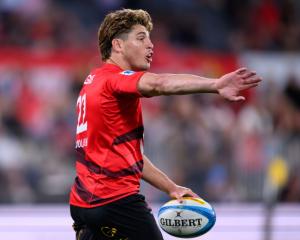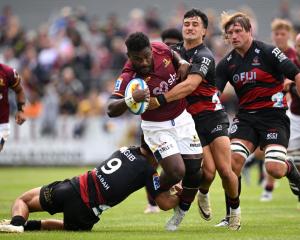There has been a long list of talents who have been on the openside flank for the All Blacks. He is the flier, the fetcher, the link man. Steve Hepburn looks at 10 of the best.
10 JOCK HOBBS
Hobbs did plenty off the field when he finished playing which in the end overshadowed his on-field efforts.
But when he came on to the scene in the early 1980s he was an outstanding openside flanker for Canterbury.
He was never far from the ball and was part of the reason Canterbury went on such a great run with the Ranfurly Shield in the early 1980s.
Captained the All Blacks in three tours after making his debut in 1983 and looked set to play a prominent part in the first World Cup.
But a series of concussions forced him into retirement in early 1987, aged just 27.
9 BILL CLARK
Injuries played a big part in Clark's career in the 1950s. He did not have a huge frame and was often prepared to put his body in places where others feared to go.
But he was a major part of the All Blacks' victory over the Springboks in 1956 and appeared to have a telepathic understanding with winger Ron Jarden.
Clark had a lot of pace for a flank forward in the 1950s and in many games appeared to have the ability turn up in the right place at the right time.
8 JOHN GRAHAM
Like Hobbs, Graham has had a significant impact on society since he hung up his boots.
He was a Taranaki product who ended up playing for Canterbury when he was teaching at Christchurch Boys' High School.
He was an intelligent player who had speed to get to the ball. Was also a solid defender.
Skippered the All Blacks in numerous tour games and was highly respected by opponents both on and off the field.
Went on to be the long-serving principal of Auckland Grammar.
7 DAVE GALLAHER
The captain of the first great All Black team, Gallaher actually played wing forward, a position which was later outlawed in rugby.
The wing-forward stood away from the scrum and would feed the ball into the scrum, instead of the halfback. It was outlawed in the 1930s as it was seen to give the All Blacks, the team which used it the most, too much of an advantage.
Gallaher did not play for the All Blacks until he was 29 but he made a big impact on the Originals tour. He had a sharp mind, and covered plenty of ground around the field.
6 WAKA NATHAN
The Black Panther. Would it have been an acceptable nickname these days?Played just 14 tests for the All Blacks but never lost one.
Started off in the Auckland Ranfurly Shield era in the early 1960s and scored a critical try in a crunch game against Canterbury.
Was never far from the ball and was big and solid enough to mix it with the biggest of forwards.
Broke his jaw on his first trip to the United Kingdom which curtailed his tour. A leg injury also knocked him out of all rugby in 1964 but was a star against the Lions a couple of years later.
5 JOSH KRONFELD
Kronfeld had a motor which just did not stop all game and he turned up all over the park.
The thing about rugby players, any sportsmen really, is they just have to keep getting better.
Kronfeld was exactly that. Started off playing colts rugby in Dunedin and then over five years gradually went up the grades before finding himself in the All Blacks at the 1995 Rugby World Cup.
Grabbed plenty of turnover ball and was the ultimate player in aiding a team's continuity.
His body took a heck of a lot of punishment but he never shirked a tackle and was a key man at the 1995 tournament with his ability to keep the All Black attack going.
4 CHARLIE SEELING
Nicknamed Bronco, giving an indication of how tough and strong he was.
Seeling was born in Wanganui but was lured to Auckland early in his career where he starred in the blue and white jersey.
First played for the All Blacks just after he turned 21 and then was one of the stars of the Originals tour.
He played in all five internationals and was a constant menace for opposition teams.
Big, strong and fast, he just never stopped.
Continued to be picked for the All Blacks and played all three tests against the Anglo-Welsh in 1908.
Ended up playing 11 tests and 39 games for the All Blacks before heading to play league in northern England, playing more than 10 years for Wigan.
Stayed in the United Kingdom and was planning to head back to New Zealand when he was killed in a car accident, aged 73.
3 GRAHAM MOURIE
If ever there was someone who was destined to be an All Black captain, it was Mourie.
Off a farm in Opunake, he came into the All Black side after the Lions had beaten them in the second test of the 1977 series. Had earlier gone to South America with an All Black team which was not awarded test caps. Although he was not captain on debut he quickly became the leader on the end-of-the-year tour to France.
Mourie was one of those guys who was always in the right place at the right time. Led the All Blacks to their first Grand Slam and then scored a great try against the Welsh in the centenary test in 1980.
Did not play the Springboks in 1981 on ethical grounds and then retired the following year, three days after his 30th birthday.
2 MICHAEL JONES
The iceman. Timed his arrival on the international stage with perfection and changed the role of the position.
Scored the first legitimate try in the World Cup and was an undoubted star in the 1987 tournament. Could run like a back and had an explosive turn of pace. Was light years ahead of any other No 7 in the inaugural tournament.
Was also mean in the tackle, and hit hard against all sizes.
A serious knee injury looked to have ended his career in 1989 but he bounced back and recovered to play the next year, though was perhaps never quite the same.
Continued to play hard throughout the early '90s and saw off all challenges, though injuries often sidelined him.
Jones though can indirectly claim birth of sports talkback. Whether he would go to a third World Cup became a lively debate on Sports Roundup one day with Keith Quinn in charge and such was its popularity that people kept ringing. Nearly 20 years later they still are.
1 RICHIE McCAW
When Josh Kronfeld was about to head overseas there was no obvious contender for the breakaway role.
But within a year McCaw emerged and he has had a mortgage over the position ever since.
Started out as a pure fetcher and defender but over the past couple of years has become more of a runner and creator.
Has played some great games over the years and it was fitting that he was the first All Black to bring up 100 test caps.
McCaw's body takes some beatings and he is not liked by many of his opponents.
But he can pilfer ball and clean out players and his all-round play and leadership was a big contributor to the All Blacks winning the World Cup in their own country, after a 24-year drought.












